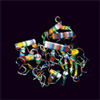 Stephen Morris and Gillian Gilbert’s unabashedly poppy New Order side project has remained a largely forgotten one, aside from perhaps the small splash created by their debut single in 1990. While there are certainly some artistic reasons for O2’s marginalization, the duo’s most significant problems were bad luck, bad timing, and the chaos surrounding the collapse of Factory Records. Thankfully, LTM has now reissued both of their albums, giving them a long-deserved second chance to find some appreciative ears.
Stephen Morris and Gillian Gilbert’s unabashedly poppy New Order side project has remained a largely forgotten one, aside from perhaps the small splash created by their debut single in 1990. While there are certainly some artistic reasons for O2’s marginalization, the duo’s most significant problems were bad luck, bad timing, and the chaos surrounding the collapse of Factory Records. Thankfully, LTM has now reissued both of their albums, giving them a long-deserved second chance to find some appreciative ears.
Superhighways is The Other Two’s second (and final?) album and was originally released in 1999, nearly a decade after its predecessor. Stephen and Gillian are joined by vocalist Melanie Williams for several tracks, whom UK readers may remember as the voice of a big dance hit by Manchester’s Sub Sub. In fact, the album begins with one of the William’s songs (“You Can Fly”), a piece that I found extremely jarring and kind of awful. The problem is not that Melanie is not a capable vocalist (quite the opposite, actually), but her powerful soul diva vocals are about as far from Bernard Sumner's understated deadpan as it is possible to get. For that reason (and some others), her three contributions do not sound at all like the work of New Order members. That is perfectly fine, of course, but there is a much larger problem evidenced as well, the one that is most responsible for O2’s obscurity. Many songs on this album are unapologetically slick, mainstream, and deliberately targeted for the charts, yet they were conspicuously and hopelessly detached from all prevailing musical trends at the time of their release. The first several songs of the album sound like they could have been smash hits in the late ‘80s or very early ‘90s, but O2 seem to have been blissfully indifferent to the enormous changes that had occurred in the electronic/dance music landscape during their lengthy hiatus.
However, despite their clear temporal dislocation from the electro zeitgeist, Stephen and Gillian could not disguise the fact that they still knew how to write catchy, well-produced pop gems. The first evidence of this comes with the third song, “The River,” where Gillian takes over the lead vocals. While still undeniably frothy and over-polished, Gilbert’s understated vocals are much more to my liking. Also, there is an excellent string hook and a very strong chorus. It turns out not to be fluke, as the remainder of the album grows steadily more interesting, likable, and contemporarily relevant (I especially enjoyed the melancholy, burbling “Cold Feet” and the incredibly infectious chorus of “Hello”). The duo definitely front-loaded Super Highways with “the hits,” which ironically turn out to be the least rewarding songs on the album (some even regrettably approximating a dancier Wilson Phillips). Two of the weaker tracks, however, are reprised at the end of the album in remix form as bonus tracks. Andy Votel does an excellent job turning “Super Highways” into a better song, but “You Can Fly” is still pretty dreadful (though now presented as a thumping club jam). Also included is a hard-to-find remix of the band’s sole hit (1990’s “Tasty Fish”).
I had always thought of Peter Hook as the guiding force that made New Order a great band, but I have since reevaluated my opinion somewhat. Once it gets going, Superhighways is packed full of catchy beats, inspired arrangements, tight structures, and great melodies that would have made for a great New Order album had Bernard Sumner handled the vocals (and the lyrics, which can get pretty vacuous at times). In fact, there are even some moments (like the treated classical vocal snippet in “Weird Woman”) that arguably surpass Stephen and Gillian’s day job. Even sans Sumner, Superhighways could have been a pop hit, had it been released at the right time and with proper promotion. I would definitely be embarrassed to own an album like this if it didn’t have any Factory Records associations, but at its best it is a fun and catchy guilty pleasure. I will probably only listen to this secretly, but I will listen to it.
Samples:
Read More

